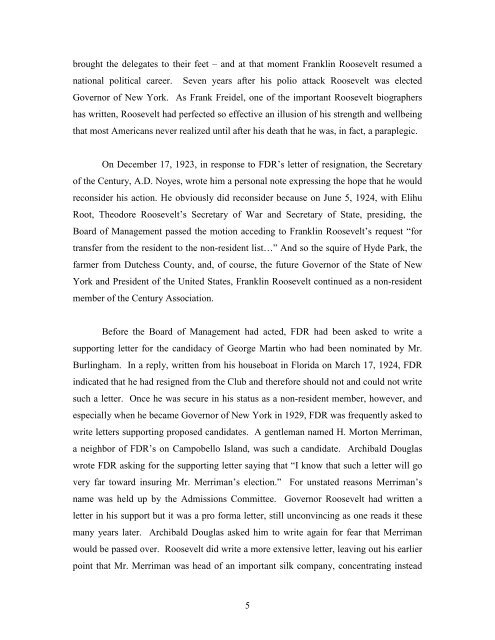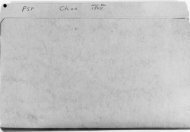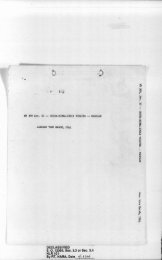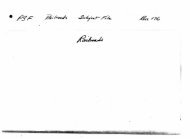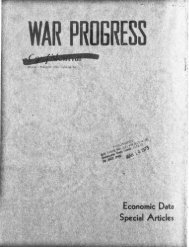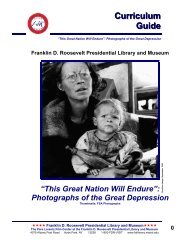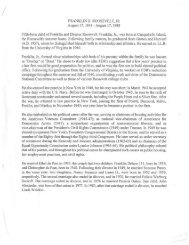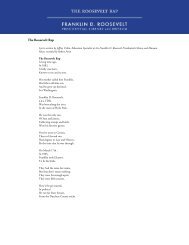Franklin Delano Roosevelt A Man of the Century
Franklin Delano Roosevelt A Man of the Century
Franklin Delano Roosevelt A Man of the Century
You also want an ePaper? Increase the reach of your titles
YUMPU automatically turns print PDFs into web optimized ePapers that Google loves.
ought <strong>the</strong> delegates to <strong>the</strong>ir feet – and at that moment <strong>Franklin</strong> <strong>Roosevelt</strong> resumed a<br />
national political career. Seven years after his polio attack <strong>Roosevelt</strong> was elected<br />
Governor <strong>of</strong> New York. As Frank Freidel, one <strong>of</strong> <strong>the</strong> important <strong>Roosevelt</strong> biographers<br />
has written, <strong>Roosevelt</strong> had perfected so effective an illusion <strong>of</strong> his strength and wellbeing<br />
that most Americans never realized until after his death that he was, in fact, a paraplegic.<br />
On December 17, 1923, in response to FDR’s letter <strong>of</strong> resignation, <strong>the</strong> Secretary<br />
<strong>of</strong> <strong>the</strong> <strong>Century</strong>, A.D. Noyes, wrote him a personal note expressing <strong>the</strong> hope that he would<br />
reconsider his action. He obviously did reconsider because on June 5, 1924, with Elihu<br />
Root, Theodore <strong>Roosevelt</strong>’s Secretary <strong>of</strong> War and Secretary <strong>of</strong> State, presiding, <strong>the</strong><br />
Board <strong>of</strong> <strong>Man</strong>agement passed <strong>the</strong> motion acceding to <strong>Franklin</strong> <strong>Roosevelt</strong>’s request “for<br />
transfer from <strong>the</strong> resident to <strong>the</strong> non-resident list…” And so <strong>the</strong> squire <strong>of</strong> Hyde Park, <strong>the</strong><br />
farmer from Dutchess County, and, <strong>of</strong> course, <strong>the</strong> future Governor <strong>of</strong> <strong>the</strong> State <strong>of</strong> New<br />
York and President <strong>of</strong> <strong>the</strong> United States, <strong>Franklin</strong> <strong>Roosevelt</strong> continued as a non-resident<br />
member <strong>of</strong> <strong>the</strong> <strong>Century</strong> Association.<br />
Before <strong>the</strong> Board <strong>of</strong> <strong>Man</strong>agement had acted, FDR had been asked to write a<br />
supporting letter for <strong>the</strong> candidacy <strong>of</strong> George Martin who had been nominated by Mr.<br />
Burlingham. In a reply, written from his houseboat in Florida on March 17, 1924, FDR<br />
indicated that he had resigned from <strong>the</strong> Club and <strong>the</strong>refore should not and could not write<br />
such a letter. Once he was secure in his status as a non-resident member, however, and<br />
especially when he became Governor <strong>of</strong> New York in 1929, FDR was frequently asked to<br />
write letters supporting proposed candidates. A gentleman named H. Morton Merriman,<br />
a neighbor <strong>of</strong> FDR’s on Campobello Island, was such a candidate. Archibald Douglas<br />
wrote FDR asking for <strong>the</strong> supporting letter saying that “I know that such a letter will go<br />
very far toward insuring Mr. Merriman’s election.” For unstated reasons Merriman’s<br />
name was held up by <strong>the</strong> Admissions Committee. Governor <strong>Roosevelt</strong> had written a<br />
letter in his support but it was a pro forma letter, still unconvincing as one reads it <strong>the</strong>se<br />
many years later. Archibald Douglas asked him to write again for fear that Merriman<br />
would be passed over. <strong>Roosevelt</strong> did write a more extensive letter, leaving out his earlier<br />
point that Mr. Merriman was head <strong>of</strong> an important silk company, concentrating instead<br />
5


